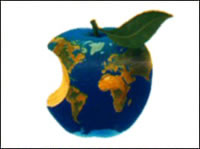
Our world has an amazing amount of potential, but alarm bells are going off in all directions, set off by innumerable experts drawing our attention to the fact that our current lifestyle is not sustainable: we cannot carry on like this! Economic growth, as it has taken shape over the recent decades, creates increasing social and ecological stresses. The pressures on earth’s systems and natural resources are building up. The economy is expanding but the ecosystem it depends on is not; this discrepancy is creating a relationship that is increasingly strained. Environmental indicators are increasingly negative. Forests are shrinking, ground water is becoming polluted, the soil is becoming eroded, fish are growing scarce, rivers drying up, coral dying, entire vegetable and animal species vanishing.
We are behaving as though we are the last generation on earth.
The divide is widening between so-called developed countries and the others: the rich getting richer, the poor getting poorer with less and less chance of improving their lot. And within our countries this gap between the rich and those excluded by the economy is also widening.
We are behaving as though the human family did not exist.
Many of us benefit from this growth. But it is a growth whose fruits go principally, and increasingly, to those who are already affluent; a growth that has very little discernment in polluting and exploiting the limited heritage that has been entrusted to us, the natural environment. To the extent that there are some who predict major disasters, either ecological or social, or even both.
Where does the fault lie?
Rather than talk about fault, we prefer to formulate the question as follows: “who is behind these imbalances?” and, hence, “who bears responsibility for them?” And “can, would, that same ‘who’ participate in rebalancing what needs to be rebalanced?”
In 1987, the United Nations published the Brundtland Report. The report underlined the correlation between poverty around the world and the damage to the natural environment. It also demonstrated that long-term economic growth, the fight against poverty and effective management of the environment often go hand in hand. The report was the first to define the concept of sustainable development, implying a type of economic development that is ecologically sensible and socially fair.
The notion of sustainable development is increasingly recognized as the framework providing access to a better quality of life for the greatest number and in the long-term. This type of development seeks to meet our current needs without comprising the needs of future generations. With this goal in mind, it wants to balance economic, social and environmental issues by ensuring that each of these areas develops fully without doing so to the detriment of the others. Sustainable development has thus become sufficiently indispensable as a concept that it is now incorporated into governmental polices in many industrialized countries, at least as far as environmental issues are concerned.
Agenda 21, the reference document on sustainable development, goes further than the Brundtland Report. It provides a brief and decisive response to the question of responsibilities with its statement: “the major cause of the continued deterioration of the global environment is the unsustainable pattern of consumption and production, particularly in industrialized countries, which is a matter of grave concern, aggravating poverty and imbalances.” There lies the essential question; we produce and consume in an unsustainable manner.
What is our responsibility towards future generations from whom, as the saying goes, we are borrowing the earth?
As underlined in Agenda 21, we have to modify these unsustainable patterns and gradually replace them with modes of production and consumption that take more effective account of social and environmental dimensions. How shall we do so? And who can do it? These are the questions we cannot ignore.
[1]
[1] Extract from Economic Actors’ Participation in Social and Environmental Responsibility – A Guide to Promoting Ethics and Sustainable Development, published July 2006 by Éditions Charles Léopold Mayer, coordinated by Vincent Commenne, co-funded by the Charles Léopold Foundation for the Progress of Humankind and the European Commission (DG Employment, Social Affairs and Equal Opportunities).


